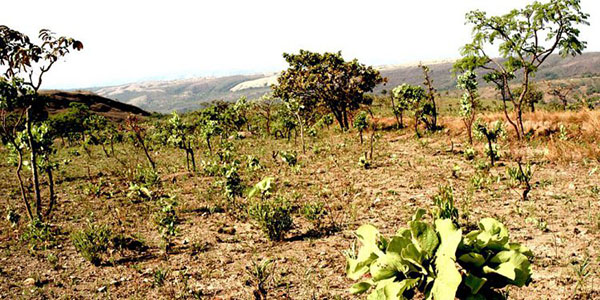Tesco has joined the first funders of an initiative to end deforestation in one of Brazil’s most important areas of biodiversity. But its CEO says more corporates need to contribute.
Its £10 million pledge over five years to Funding for Soy Farmers in the Cerrado pays farmers to protect native vegetation and produce soy only on existing agricultural land.
Animal nutrition business, Nutreco, and Grieg Seafood are also committing funds.
Tesco Group CEO, Dave Lewis said, “We source much of our soy for animal feed from Brazil and the Cerrado region, so it’s only right we play a leading role in protecting this biodiverse region.
“The Funding for Soy Farmers in the Cerrado initiative is the first step in safeguarding a huge, biodiverse and carbon-rich area of Brazil, while also allowing farmers to continue to farm soy sustainably.
“This… will only be truly transformative if more organisations come forward and support it.”
Farmers “should be rewarded” for environmental services
Farmers connected to the programme include Luiz Pradella a soy farmer in Bahia, who has said, “Payment for environmental services is recognition of the very few individuals who contribute to the good of all.
“We must socialise the benefit and the cost. Environmental services are for the planet, so the service provider (farmer) should be rewarded for it.”
Cesare, a soy farmer in Maranhão, said, “It is important to use tools such as payments for environmental services as an incentive.
“The applicability of tools like financial mechanisms are mandatory to achieve preservation and maintenance of the environment.”
Paulo Rickly, also a soy farmer in Maranhão, said “This idea of payments for environmental services… will help to keep most of these areas preserved.”
Tesco hopes more companies will come forward to support the initiative in the coming weeks.
A December Statement of Support for the Cerrado Manifesto is endorsed by 160 global FMCG companies and institutional investors.
It calls on investors to support companies in halting the deforestation of the Cerrado, adopting sustainable practices and mitigating financial risks associated with deforestation and climate change.
It says, “We… are committed to halting forest loss associated with agricultural commodity production and to working with industry, producers, governments and civil society to protect globally important natural landscapes…
“We recognise the critical importance of the Cerrado for its role in climate change mitigation, as a repository for biodiversity, as the source of many of Brazil’s freshwater systems, and additionally as a production region for the agricultural commodities used in our products…
“The Brazilian Forest Code… offers little protection in the Cerrado… regulation on its own is currently insufficient for the protection of the Cerrado.
“Market-facing companies cannot achieve this on our own and we call on other supply chain actors, government, investors and civil society to share our goal.”
Cargill didn’t sign but says progress must improve
Feed supplier Cargill issued a statement shortly after Tesco’s announcement saying, “While we may not have signed the Manifesto, we agree progress… to address deforestation in South America must be accelerated.
“In Brazil, we calculate the latest directly sourced soy crop (2018-2019) was 95.68% deforestation-and conversion-free.
“We recognise the urgency to address deforestation and native vegetation land conversion in the Cerrado… Many of our customers are signatories of the Cerrado Manifesto Statement of Support.”
FAIRR, the organisation behind the initiative found none of the 50 meat and dairy companies it assessed had a comprehensive policy to address or mitigate deforestation in all the regions they source soy and/or cattle from.
The Cerrado is home to 5% of global biodiversity and stores nearly 13.7 billion tonnes of carbon. However, Brazil’s Forest Code only requires farmers in the Cerrado to conserve 20-35% of their forests and native vegetation and most Brazilian soy comes from this region.
Two thirds of the soy imported by the UK is for animal feed.























